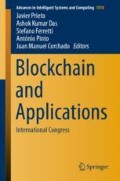Abstract
Blockchain based systems become more and more prominent. While starting by developing (crypto)currency payment schemes, a lot of the latest development goes in the direction of executing source code directly in the peer-to-peer network blockchains are usually built on. These so called smart contracts have become popular in order to reduce the amount of necessary middle-mans involved in different processes. Despite the large amount of research already invested in the design of languages which support smart contracts, there are still a lot of problems in the existing approaches, regularly resulting in security flaws. One of these problems is the complexity of the used languages. Therefore, this paper provides an evaluation of currently deployed smart contracts with respect of the requirements of those contracts concerning computability. The finding is that most of the currently deployed smart contracts do not need Turing complete languages, but could also be implemented based on a simpler design of the underlaying language.
Access this chapter
Tax calculation will be finalised at checkout
Purchases are for personal use only
References
Tama, B.A., Kweka, B.J., Park, Y., Rhee, K.H.: A critical review of blockchain and its current applications. In: Proceedings of the International Conference on Electrical Engineering and Computer Science (ICECOS), pp. 109–113. IEEE (2017)
Wright, C., Serguieva, A.: Sustainable blockchain-enabled services: smart contracts. In: Proceedings of the International Conference on Big Data, pp. 4255–4264. IEEE (2017)
Alharby, M., Van Moorsel, A.: Blockchain-based smart contracts: a systematic mapping study (2017). arXiv preprint arXiv:1710.06372
Nakamoto, S.: Bitcoin: a Peer-to-peer Electronic Cash System (2008). https://bitcoin.org/bitcoin.pdf
Atzei, N., Bartoletti, M., Cimoli, T.: A survey of attacks on Ethereum smart contracts (SoK). In: Principles of Security and Trust, pp. 164–186. Springer, Heidelberg (2017)
Mehar, M.I., Shier, C.L., Giambattista, A., Gong, E., Fletcher, G., et al.: Understanding a revolutionary and flawed grand experiment in blockchain: the DAO attack. SSRN Electron. J. (2017). https://doi.org/10.2139/ssrn.3014782
Church, A.: An unsolvable problem of elementary number theory. Am. J. Math. 58(2), 345–363 (1936)
Wright, C.: Turing Complete Bitcoin Script White Paper (2016). https://ssrn.com/abstract=3160279
Wright, C.: Beyond Godel (2018). https://ssrn.com/abstract=3147440
Sgantzos, K.: Implementing a church-turing-deutsch principle machine on a Blockchain. Department of Computer Science and Biomedical Informatics, University of Thessaly, Lamia, Greece (2017)
Herlihy, M.: Atomic cross-chain swaps (2018). arXiv preprint arXiv:1801.09515
Bhargavan, K., Delignat-Lavaud, A., Fournet, C., Gollamudi, A., Gonthier, G., et al.: Formal verification of smart contracts: short paper. In: Proceedings of the Workshop on Programming Languages and Analysis for Security, pp. 91–96. ACM, October 2016
Castrillo-Fernández, O.: Web Scraping: Applications and Tools (2005). https://www.europeandataportal.eu/sites/default/files/2015_web_scraping_applications_and_tools.pdf
Goyvaerts, J., Levithan, S.: Regular Expressions Cookbook. O’reilly, Sebastopol (2012)
Author information
Authors and Affiliations
Corresponding author
Editor information
Editors and Affiliations
Rights and permissions
Copyright information
© 2020 Springer Nature Switzerland AG
About this paper
Cite this paper
Jansen, M., Hdhili, F., Gouiaa, R., Qasem, Z. (2020). Do Smart Contract Languages Need to Be Turing Complete?. In: Prieto, J., Das, A., Ferretti, S., Pinto, A., Corchado, J. (eds) Blockchain and Applications. BLOCKCHAIN 2019. Advances in Intelligent Systems and Computing, vol 1010 . Springer, Cham. https://doi.org/10.1007/978-3-030-23813-1_3
Download citation
DOI: https://doi.org/10.1007/978-3-030-23813-1_3
Published:
Publisher Name: Springer, Cham
Print ISBN: 978-3-030-23812-4
Online ISBN: 978-3-030-23813-1
eBook Packages: Intelligent Technologies and RoboticsIntelligent Technologies and Robotics (R0)

